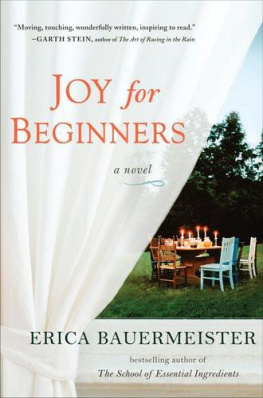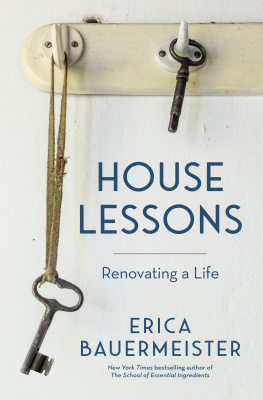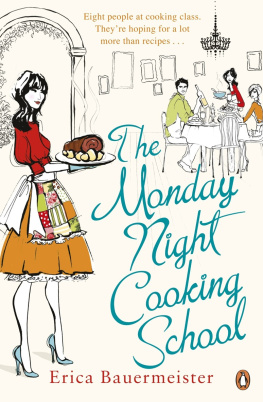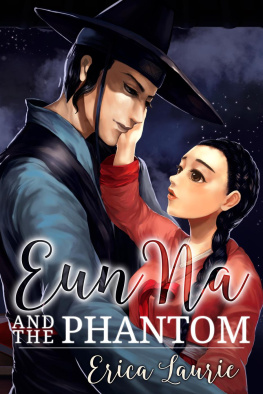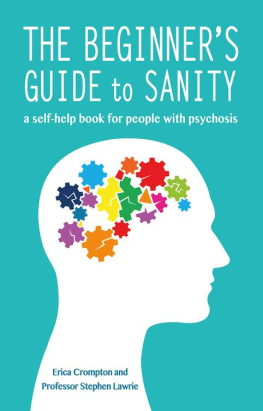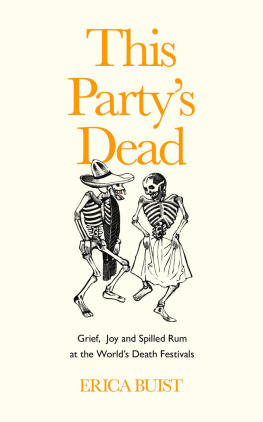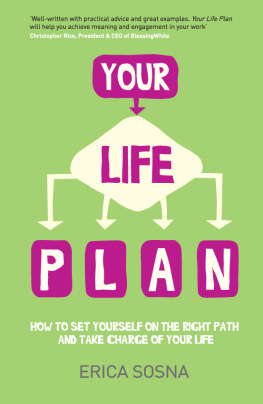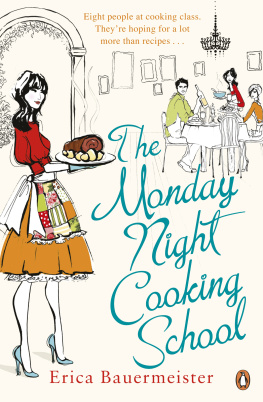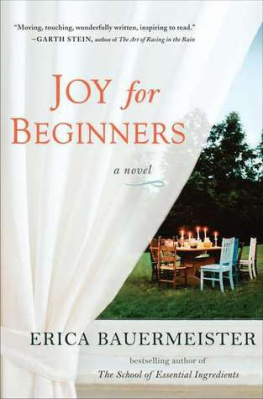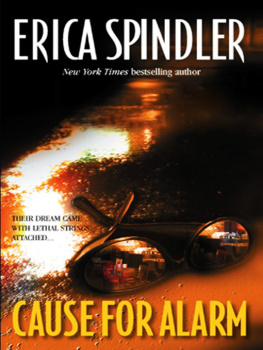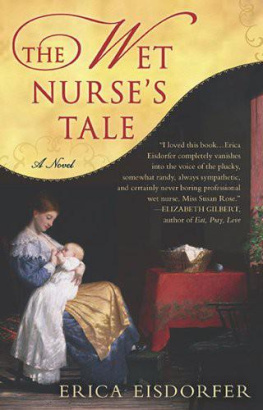ACKNOWLEDGMENTS
There were so many things to learn about while writing this book. Barbara Dunshee graciously gave me access to her pottery class. Pan D Amore bakery in Port Townsend allowed me to come in during the early hours of the morning and spend the rest of the day with the smell of fresh bread lingering on my skin. Jerilynn Brousseau gave me hands-on lessons in the art of bread dough and generosity. Nancy and Bob Forten of Sweet Life Farms on Bainbridge Island handed me a warm loaf and a jar of one-hundred-year-old sourdough starter. Kim Ricketts and Michael Hebb of Onepot.org introduced me to the magic of underground restaurants. Katie Mesmer kept my feet moving for every one of those sixty miles on the 3-Day Breast Cancer Walk. Jeff McLeans travel photos were an inspiration, and Dian Campbells knowledge of gardening was indispensable. Lucy Buckley and my sweet husband, Ben, coerced me into going down the Grand Canyon, and the guides of Canyon Explorations taught us all about grace under pressure.
Sometimes another persons words are the best. Few authors could capture the feeling of midlife better than Anne Morrow Lindbergh, whose lines from a Gift from the Sea are quoted in Carolines story. I heard Paul Roe, owner of the BritishInk tattoo parlor, remark that irreversible decisions are good for the soul during an NPR interview, and I loved the concept so much that I borrowed his words for Marions story.
Every word of this book has been lovingly tended by an incredible group of friends and cohorts who read my early drafts, and later drafts, and still later draftsGloria Bauermeister, Marjorie Osterhout, Mark Craemer, Genevieve Hagen, Nina and Bill Meierding, Holly Smith, Caitlin Bauermeister and Dorothy Rechtin. Thank you for your clear eyes and suggestions. And a deep bow of gratitude to Amy Berkower, Maja Niklovich and Rachel Kahan, whose insights and intelligence guided the manuscript into safe harbor.
And then there are those whose emotional support makes it all possible. So heres a hats-off to the camaraderie of the Seattle7Writers, whose talent and friendship inspire me on a daily basis. And my familyBen, Caitlin and Rylanwho opened their arms and invited these characters into their lives.
Also by Erica Bauermeister
FICTION
The School of Essential Ingredients
NONFICTION
500 Great Books by Women: A Readers Guide
with Jesse Larsen and Holly Smith
Lets Hear It for the Girls: 375 Great Books for Readers 2-14
with Holly Smith
Also by Erica Bauermeister
FICTION
The School of Essential Ingredients
NONFICTION
500 Great Books by Women: A Readers Guide
with Jesse Larsen and Holly Smith
Lets Hear It for the Girls: 375 Great Books for Readers 2-14
with Holly Smith
ABOUT THE AUTHOR
Erica Bauermeister is the author of the novel The School of Essential Ingredients and the coauthor of 500 Great Books by Women: A Readers Guide and Lets Hear It for the Girls: 375 Great Books for Readers 2-14. She lives in Seattle with her husband and their two children. She may or may not have a tattoo.
CAROLINE
Things held on to Carolinethe ends of her sleeves caught by doorknobs, her coat in a car door, the knit of her Irish sweater snagged on an errant nail that no one had ever remembered seeing sticking out of the wall. But she had never been as good at catching, holding on to thingstaxicabs, elevator doors, a husband, slipping closed and past, already on their way to another floor, another life.
Her son had nestled into her heart, all tousled hair and awkward elbows, and then he was off to college. Her parents had died. And now Jack had left her, rocketing like a boy down a water slide into the exuberance of his new, defiantly not-middle-aged existence.
I should learn to be slippery, Caroline said to Marion when they met for coffee a few days after Kates celebration in the garden. I need to be sleek and unobtainable. All silk suits and no commitments.
You know what silk is made out of, Marion commented mildly. She pushed her silver hair back from her face and studied her friend.
MARION WAS A PERSON who had held on to Caroline. They had met years before, when Marion was writing an article about public yet intimate gathering spots, the modern equivalents of the old woodstove in the general store of pioneer days. The bookstore where Caroline worked was a perfect example, designed as a place to linger as much as shopincorporating a bakery and cafe, a fireplace surrounded by oversized chairs for colder days and a patio outside for summer ones. It could have felt chaotic, a party full of strangers unable to introduce themselves, but instead was more like a genial conversationthe metallic clink of silverware set against the contented sigh of a book being slid from its shelf, the murmured comments of a knitting group seated at a round table in the three-sided alcove that heldwas it intentional or simply serendipitous?the house/garden/cooking books. Smells of cinnamon and yeast settling in between the covers of books only to rise from the pages when they were opened later at home.
Caroline loved the store. She had started going there almost twenty years before, when her son was in preschool and they would go for story hour. Caroline would buy a mug of coffee and watch her little boy, engrossed, listening to tales of muddy dogs and brave princesses. A few years later, when Brad was in elementary school and she was in what she would later call her writing phase, she had come to the bookstore in the mornings to sit at one of the wooden tables in the cafe, pretending to write but really just allowing her eyes to slow and settle on the collage of mismatched chairs around her, the wideplank pine floors, the way the bookshelves created a child-sized maze behind her. The espresso machine would make its hissing noise and she would listen to the conversations around her, to lives that were more or less interesting than her own. Later in the evening at home, Jack would ask her what she had written, or rather, how much. She would lie and tell him the stories she had heard as if they were of her creation, grateful for the loan of them, for the free pass they gave her into a few hours floating in a world not of her own making.
After a while, however, it became obvious that the stories were not connected, were not in any case going to be a book, and Caroline had been grateful once again for the bookstore and the job she was offered as its used-book buyer. Brad had been well ensconced in school by that time, and Caroline had loved dropping him off and driving to the bookstore, anticipating the smell of old paper and warm blueberry muffins, ground espresso beans and nutmeg and ink.
It was quiet behind the counter where people dropped off their bags and boxes of books, then went to wander among the shelves or drink coffee while she assessed the value of their reading habits. First, you had to get rid of the esoteric tomes no one else would want; the beach reads that everyone else had already read and sold, sand filtering out of their pages like used-up words; the books that had been stuffed into the bottom of backpacks along with, she was sure, old bananas. For books in good condition, she would offer a quarter of the original price in store credit. Less, if people wanted a quick exit and cash.
At first Caroline had seen the job of used-book buyer as a stepping-stone to the more exciting world of the new releases displayed at the front of the store, their words freshly printed, their meanings clean as new sheets. But she quickly realized she had an affinity for the older books and their muted scents of past dinners and foreign countries, the tea and chocolate stains coloring the phrases. You could never be certain what you would find in a book that had spent time with someone else. As Caroline had riffled through the pages looking for defects, she had discovered an entrance ticket to Giverny, a receipt for thirteen bottles of champagne, a to-do list that included, along with groceries and dry cleaning, the simple reminder: buy a gun. Bits of life tucked like stowaways in between the chapters. Sometimes she couldnt decide which story she was most drawn to.

